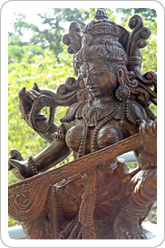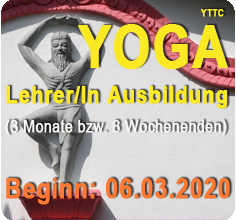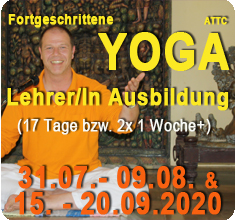Self Knowledge
![]()
![]() In Vedanta (end of the knowledge), which is the last part of the Vedas/Upanishads - the essence - it is completely clearly described, how the human spirit is conditioned and which applies it to ascend in order to free himself from the slavery of the mind, in order to ascend to the master of the mind. Meditation is seen thereby completely clearly as the natural state of humans and interpreted not "only" as an exercise or a practice.
In Vedanta (end of the knowledge), which is the last part of the Vedas/Upanishads - the essence - it is completely clearly described, how the human spirit is conditioned and which applies it to ascend in order to free himself from the slavery of the mind, in order to ascend to the master of the mind. Meditation is seen thereby completely clearly as the natural state of humans and interpreted not "only" as an exercise or a practice.
 To be in meditation is to be with yourself where there is no more any conflict between the Self, the Awareness and the thoughts that come up within It. It is the „I“-thought, which creates the disturbance, which does not accept a thought, rejects a thought. Between the space and the objects that are suspended in it, there is no conflict. Space is not burdened by the stars. But if the space embodies itself as an object, then even a small stone would be a load.
To be in meditation is to be with yourself where there is no more any conflict between the Self, the Awareness and the thoughts that come up within It. It is the „I“-thought, which creates the disturbance, which does not accept a thought, rejects a thought. Between the space and the objects that are suspended in it, there is no conflict. Space is not burdened by the stars. But if the space embodies itself as an object, then even a small stone would be a load.
In the formless space everything is suspended. In the formless consciousness, awareness every thought is suspended. Make it „I know“, even one thought would be a burden. Without the „I“-thought, nobody suffers. Consciousness identifies with one body and mind and announces itself as an individual „I“. Then every thought becomes a burden on it. Thus the „I“-thought is responsible for all conflicts.
Meditation means living every moment of life. Enjoying one’s own Self and being aware of one’s own Self is the real meditation. For your enjoyment you do not need a decorated creation; you do not need a particular condition. You are happy because you are the Happiness itself. Thereafter, every decoration you have, is an added celebration.
"Nityotsavah bhavati tesãm" – for them living becomes a constant celebration because the man is happy with himself. Sitting down in meditation is not to pass judgment on your
![]()
thoughts nor to negate the creation nor negate every impression. Be with yourself and recognise every thought as it is.
![]()





